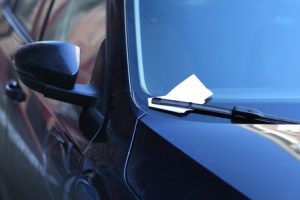Honk Honk: Parking Tickets And Bankruptcy

While the number of filings has declined overall, Chicago has the the highest number of non-business Chapter 13 bankruptcy filings in the country, and almost half of them list the Chicago Parking Bureau as one of the creditors.
The Windy City is notorious for its high parking ticket fines and aggressive collection procedures. In 2015, the city was owed $1.5 billion in unpaid fines from 4 million parking tickets; in contrast, New York City had $756 million from 10 million tickets. Chapter 13 trustee (person who oversees the bankruptcy for the judge) Glenn Stearns says that a single unpaid ticket can balloon to more than $4,000 in penalties that eventually result in drivers’ license suspension and vehicle impoundment.
In 2014, a bankruptcy fraudster circulated Chapter 13 petitions on the street for drivers to show the CPB. Consumers filed about 1,000 of these petitions which listed only two creditors: the CPB and the Department of Revenue. Most of these cases were quickly dismissed, and the FBI eventually arrested the fraudster.
Dischargeable Debts and Collateral Consequences
One of the reasons the parking ticket/Chapter 13 fraud was so widespread is that the CPB was one of the few entities that forgave both the underlying debt (in this case, the unpaid parking ticket) and the collateral consequences of that unpaid debt (the vehicle impound). Once the trustee closed that loophole, the scheme started to unravel.
Many unsecured debts fall into this category. Assume the debtor owes money to a college or university that is withholding the debtor’s transcript. Bankruptcy eliminates the debt, but the school still has the right to withhold the transcript pending payment or other resolution. Income tax debt is a better example. If the return was filed at least three years ago, the debt is at least two years old, and the taxing authority has not assessed the debt in the last 240 days, the bankruptcy judge will discharge the debt. However, the judge has no authority to cancel a lien.
Sometimes, the opposite is true. Under current law, student loans are difficult to discharge in Indiana and Illinois. However, if the bank is garnishing the debtor’s wages, bankruptcy ends this garnishment. The same thing applies to lawsuits and other collection attempts. That’s because the automatic stay applies to all debts, whether or not they are ultimately discharged.
Criminal Penalties
Generally, fines that punish the defendant are nondischargeable and fines that reimburse the government are dischargeable.
- Punitive: Nearly all criminal fines, such as bad check fees and victim restitution, are punitive in nature and therefore nondischargeable in either a Chapter 7 or Chapter 13; some parking and traffic ticket fines may be dischargeable in a Chapter 13.
- Reimbursement: Court costs and other such expenses are usually dischargeable.
Unpaid tolls are in a gray area, but the better argument is they are dischargeable because these fees reimburse the government for road maintenance expenses.
Partner With Experienced Lawyers
Bankruptcy eliminates debts, but may not eliminate the secondary consequences of these debts. For a free consultation with an experienced bankruptcy lawyer in Chicago, contact the Bentz Holguin Law Firm, LLC. After hours appointments are available.
Resources:
law.cornell.edu/uscode/text/11/362
medill.northwestern.edu/chicago/expensive-chicago-parking-tickets-contribute-to-huge-bankruptcy-filings/


